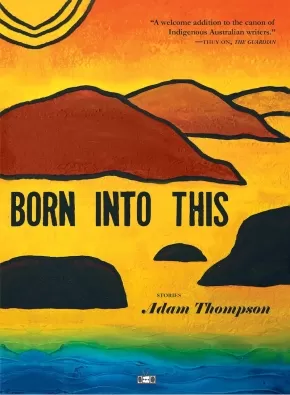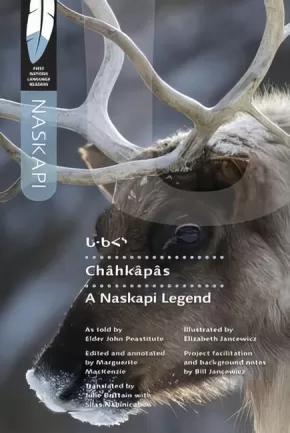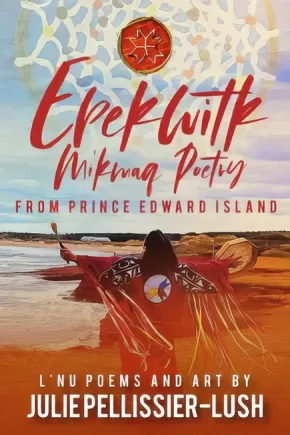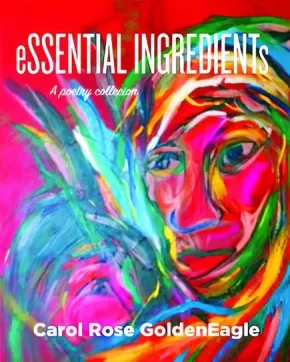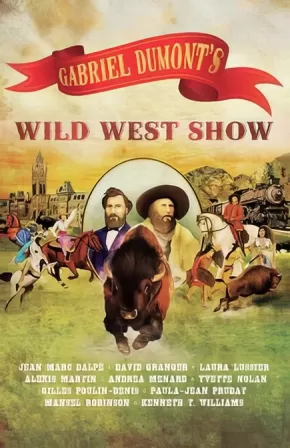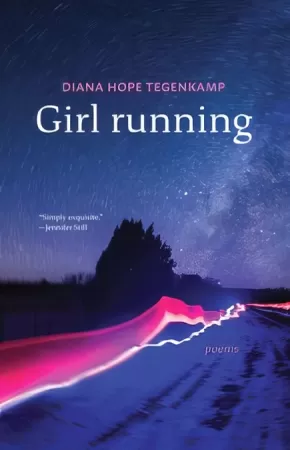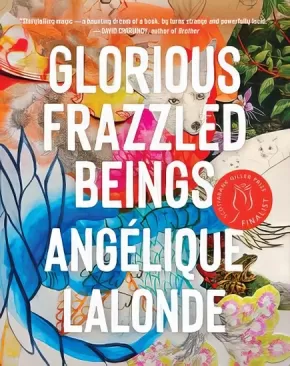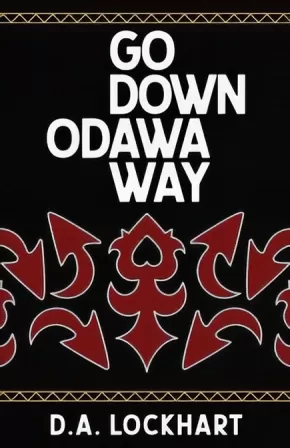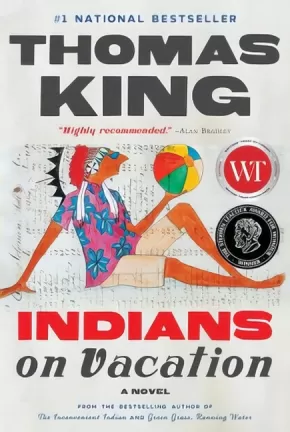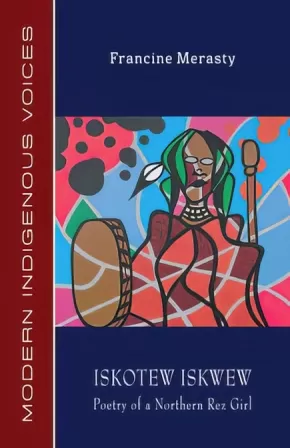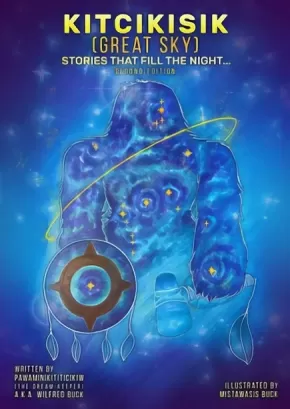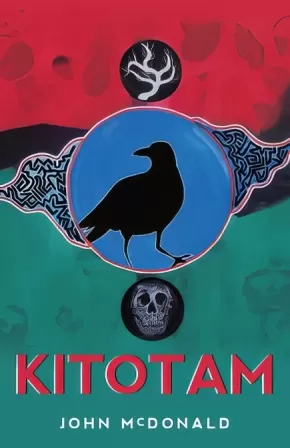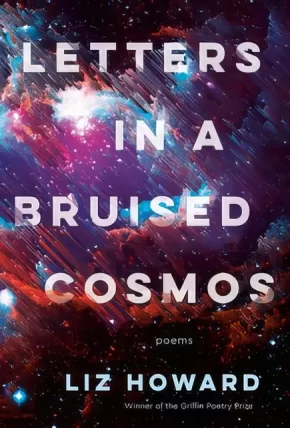
Fiction
271
-
285
of
568 Results;
Sort By
Go To
of 38
Born Into This
$23.50
Format:
Paperback
Text Content Territories:
Indigenous Australian; Indigenous Tasmanian (Palawa);
ISBN / Barcode: 9781953387042
Synopsis:
Synopsis:
"With its wit, intelligence and restless exploration of the parameters of race and place, Thompson’s debut collection is a welcome addition to the canon of Indigenous Australian writers." —Thuy On, The Guardian
The remarkable stories in Born Into This are eye-opening, razor-sharp, and entertaining, often all at once.
From an Aboriginal ranger trying to instill some pride in wayward urban teens on the harsh islands off the coast of Tasmania, to those scraping by on the margins of white society railroaded into complex and compromised decisions, Adam Thompson presents a powerful indictment of colonialism and racism.
With humor, pathos, and the occasional sly twist, Thompson’s characters confront discrimination, untimely funerals, classroom politics, the ongoing legacy of cultural destruction, and — overhanging all like a discomforting, burgeoning awareness for both black and white Australia — the inexorable disappearance of the remnant natural world.
Reviews
"Thompson portrays a group of Aboriginal communities in Tasmania in his riveting debut collection... The author movingly describes their resilience, whether facing aggressive storms or the terror of colonization."—Publishers Weekly
"Some stories are morbidly comic while others cut deep, conveying the absurdity and despair of Indigenous experiences of settler-colonialism across Tasmania."—Tristen Harwood, The Saturday Paper
"Born Into This represents the emergence of a fresh and vital voice on the Australian literary scene. Indigenous writer Adam Thompson expertly combines wit and pathos in his debut short story collection. With stories from a diversity of perspectives, but bound by its Tasmanian setting, Thompson’s mastery over his characters and sensibility for contemporary issues makes this a special collection."—Happy Mag, Best New Books of 2021
Additional Information
142 pages | 5.50" x 7.50" | Paperback
Châhkâpâs: A Naskapi Legend
$24.95
Artists:
Editors:
Format:
Paperback
Text Content Territories:
Indigenous Canadian; First Nations; Innu (Montagnais-Naskapi);
Grade Levels: 12; University/College;
ISBN / Barcode: 9780889778290
Synopsis:
Synopsis:
Châhkâpâs: A Naskapi Legend shares the story of Châhkâpâs, a heroic figure in First Nations storytelling, who performs feats of strength and skill in spite of his diminutive size.
The book shares this traditional legend as originally recorded in the Naskapi community in northern Quebec in 1967 when it was narrated by John Peastitute, a Naskapi Elder and accomplished storyteller. Transcribed in the Naskapi language and syllabic orthography, the book offers a literary resource for the Naskapi language community, and the English translation enables those unfamiliar with the language, or the story, to discover this important legend.
The book also contains extensive analysis of stories about Châhkâpâs, notes about the provenance of the recordings, a biography of the storyteller, and a history of the Naskapi people. Lavish illustrations from Elizabeth Jancewicz—an artist raised in the Naskapi community—provide a sensitive and accurate graphical account of the legend, which has also been approved by Naskapi speakers themselves.
Educator & Series Information
This book is part of the First Nation Language Readers series. With a mix of traditional and new stories, each First Nations Language Reader introduces an Indigenous language and demonstrates how each language is used today.
By John Peastitute
Edited by Marguerite MacKenzie
Translated by Julie Brittain and Silas Nabinicaboo
Illustrated by Elizabeth Jancewicz
Contributions by Bill Jancewicz
Additional Information
264 pages | 6.00" x 9.00" | Paperback
Creeland
$18.95
Format:
Paperback
Text Content Territories:
Indigenous Canadian; First Nations; Cree (Nehiyawak);
ISBN / Barcode: 9780889713925
Synopsis:
Synopsis:
Creeland is a poetry collection concerned with notions of home and the quotidian attachments we feel to those notions, even across great distances. Even in an area such as Treaty Eight (northern Alberta), a geography decimated by resource extraction and development, people are creating, living, laughing, surviving and flourishing—or at least attempting to.
The poems in this collection are preoccupied with the role of Indigenous aesthetics in the creation and nurturing of complex Indigenous lifeworlds. They aim to honour the encounters that everyday Cree economies enable, and the words that try—and ultimately fail—to articulate them. Hunt gestures to the movements, speech acts and relations that exceed available vocabularies, that may be housed within words like joy, but which the words themselves cannot fully convey. This debut collection is vital in the context of a colonial aesthetic designed to perpetually foreclose on Indigenous futures and erase Indigenous existence.
the Cree word for constellation
is a saskatoon berry bush in summertime
the translation for policeman
in Cree is mîci nisôkan, kohkôs
the translation for genius
in Cree is my kôhkom muttering in her sleep
the Cree word for poetry is your four-year-old
niece’s cracked lips spilling out
broken syllables of nêhiyawêwin in between
the gaps in her teeth
Reviews
"Here is an ode to northern Alberta, to the kokums and aunties who are worlds unto themselves, to the vastness and profundity of the Cree language. Dallas Hunt’s Creeland is tender and aching and intellectually exciting. Hunt uses the lyric mode to write another kind of public history about the prairies, one in which we Cree are always beautiful and indomitable. I can’t thank him enough for this." — Billy-Ray Belcourt, February 2021
"Dallas Hunt’s debut collection of poetry is work built from the ground up, meaning he has read, loved, studied poetry. He uses language “lived” in his relationships with family, home, community. Creeland feels like home to me. It “[crackles] with love and life.”" — Marilyn Dumont, February 2021
"From index to glossary, this stunning work bends with the possibilities of saplings. Mortally aware, a mind that can be everywhere “wolf willows and pin / cherries,” here is a poet halting the mallets of supremacy. Dallas Hunt aligns “petals of / larkspur” against the “maw of the inferno” to speak of Creeland. Entwined in “pîsim’s luminous / touch,” the poet’s smile returns home. Bringing forth fine, wry and tenderizing poetry, rickety love begets gale winds, and everyday, constellatory magnitudes. A quieting read with dimensional perspective, this book will transport you." — Cecily Nicholson, February 2021
Additional Information
128 pages | 5.50" x 8.00"
Epekwitk: Mi'kmaq Poetry from Prince Edward Island
$24.95
Format:
Paperback
Text Content Territories:
Indigenous Canadian; First Nations; Mi'kmaq;
Reading Level: N/A
ISBN / Barcode: 9781773660851
Synopsis:
Synopsis:
The highly anticipated debut poetry collection of Mi'kmaq poems by Prince Edward Island's Poet Laureate, Julie Pellisier-Lush.
This collection will enthrall poetry lovers. Skilled at taking words from hearts and minds to paper, Julie's poems will connect with the reader deeply. Some poems were created with teachings from our Elders and some were created to learn more about the art of words.
At times heart wrenching and other times a call to action for Mother Earth, each poignant poem is paired with vivid artwork crafted by the poet herself.
Take what you like, use what you need, most of all enjoy.
Additional Information
96 pages | 5.50" x 9.00" | Paperback
Essential Ingredients
$18.95
Format:
Paperback
Text Content Territories:
Indigenous Canadian; First Nations; Cree (Nehiyawak); Dene;
Reading Level: N/A
ISBN / Barcode: 9781771338875
Synopsis:
Synopsis:
There are times in a parent's life when they ask why am I doing this? It's so hard. That is, until those occasions of magic happen, and they always do. Parenthood is a journey with no road map. And it is the children who most often steer the ship. In her new collection of poetry, Essential Ingredients, Carol Rose GoldenEagle recalls when Creator's blessings have truly been bestowed in a parent's shared life with their children. Poems examine hardship and struggle, triumph of spirit and joy, and serve as a reminder to all parents that childhood is fleeting. This beautiful volume is a celebration of parenthood, in the form of love letters to the poet's children. It is ultimately a tribute to the memories of those many magic moments which define love, purpose and pride.
Additional Information
100 pages | 6.00" x 7.50" | Paperback
Gabriel Dumont's Wild West Show
$24.95
Format:
Paperback
Text Content Territories:
Indigenous Canadian; Métis;
Grade Levels: 12; University/College;
ISBN / Barcode: 9781772013191
Synopsis:
Synopsis:
Gabriel Dumont’s Wild West Show is a flamboyant epic, constructed as a series of tableaux, about the struggles of the Métis in the Canadian West. It is a multilayered and entertaining saga with a rodeo vibe, loosely based on Buffalo Bill’s legendary outdoor travelling show. In 1885, following the hanging of his friend Louis Riel, bison hunter Gabriel Dumont fled to the United States. There he was recruited by the legendary Buffalo Bill, founder of Buffalo Bill’s Wild West, a gigantic outdoor travelling show that re-enacted life in the American West. It made a huge impression on Dumont, and he dreamed of putting together a similar show to tell the story of the struggle of Canada’s Métis to reclaim their rights.
The creative team behind Gabriel Dumont’s Wild West Show – including ten authors, Indigenous and non-Indigenous, French- and English-speaking men and women – brings Dumont’s dream to life in a captivating, joyously anachronistic saga. The theatrical version of Gabriel Dumont’s Wild West Show presented by the National Arts Centre was one of a number of exceptional projects funded through the Canada Council for the Arts’ New Chapter initiative. (Adapted from nac-cna.ca/en/wildwestshow).
This is a bilingual book, co-published with Éditions Prise de parole, and enhanced with a historical background, a chronology of the Métis Resistances, and visual documents.
Reviews
“Really excellent. I laughed till I cried!” —Marilou Lamontagne, ICI Radio-Canada Ottawa-Gatineau
“[A] play that pleases, puzzles, and provokes, in a form that keeps shifting wildly from one moment to the next like a bucking bronco.”—J. Kelly Nestruck, Globe and Mail
“If Gabriel Dumont’s Wild West Show is so successful, while being funny and sad at the same time, it’s because the creative team did its research and listened to the communities involved in the rehabilitating of the figure of Gabriel Dumont. What takes shape here is a wave of madness and a rewriting of our national narrative.”—Maud Cucchi, JEU Revue de théâtre
“Gabriel Dumont’s Wild West Show is a crazed, fast-paced Métis 101 history lesson, in which acidity and humour deliver the story.”—Martin Vanasse, Radio-Canada
“[A] seamlessly cohesive narrative ... a zany form ... a phantasmagorical piece of pure entertainment ... a delirious blend of historical drama, musical, burlesque cabaret, hockey night, and TV quiz!”—Pierre-Alexandre Buisson
“Between bursts of laughter (of the uneasy sort at times) and moments of lively emotion, Gabriel Dumont’s Wild West Show takes [us] on a journey up hill and down dale through the history of the Métis Resistances and tells an oft-forgotten part of our collective history.” - Valérie Lessard, Le Droit
Additional Information
304 pages | 5.40" x 8.50" | Paperback
Girl running
$24.95
Format:
Paperback
Text Content Territories:
Indigenous Canadian; Métis;
Reading Level: N/A
ISBN / Barcode: 9781771872140
Synopsis:
Synopsis:
This stellar debut collection by Métis poet Diana Hope Tegenkamp takes us through many worlds and wonders. In Girl running, we find solace and outrage, grief and tenderness, bewilderment and beauty, all “entangled in hope and dreaming.” The poet’s love of the natural world is both earthy and adamantine, and her passion for literature and art is just as rich a source for her questioning eye.
On the edge of Saskatoon, a woman opens a car door and flees. A child runs away from residential school after a beating. A Métis man’s ghost gallops on a ghost horse across the prairies. Henry James’ 19th-century heroine, Isabel Archer, runs across a wintery yard. Lana Tisdel drives away from Falls City, Nebraska, after the murder of her transgender boyfriend.
After many losses—of a mother known and loved, of a Métis father unknown and imagined—the ‘girl’ of this collection is running towards and away from mortality. In these poems, disappearances, perpetual flights, river walks, shadowy descents and miraculous returns connect daily living and mortality, current social realities and ancient histories, the surface and the subterranean depths of our complicated lives. Lovers of contemporary Canadian poetry will find that this textured collection rewards reading and rereading.
Additional Information
120 pages | 5.50" x 8.50" | Paperback
Glorious Frazzled Beings
$22.99
Format:
Paperback
Text Content Territories:
Indigenous;
Reading Level: N/A
ISBN / Barcode: 9781487009571
Synopsis:
Synopsis:
Home is where we love, suffer, and learn. Some homes we chose, others are inflicted upon us, and still others are bodies we are born into. In this astounding collection of stories, human and more-than-human worlds come together in places we call home.
Four sisters and their mother explore their fears while teeny ghost people dress up in fragments of their children’s clothes. A somewhat-ghost tends the family garden. Deep in the mountains, a shapeshifting mother must sift through her ancestors’ gifts and the complexities of love when one boy is born with a beautiful set of fox ears and another is not. In the wake of her elderly mother’s tragic death, a daughter tries to make sense of the online dating profile she left behind. And a man named Pooka finds new ways to weave new stories into his abode, in spite of his inherited suffering.
A startling and beguiling story collection, Glorious Frazzled Beings is a love song to the homes we make, keep, and break.
Reviews
"Sly, mythical, wise, Glorious Frazzled Beings is an extraordinary work of non-conformist daring: a boy is born with fox ears, an abandoned pregnancy test is encountered by random women in mall bathroom, an overwhelmed mother makes clothing for tiny ghosts. With sharp visionary instinct, Lalonde not only confronts both the magic and cruelty of living, and the border between worlds, mythical and visceral — she lights it on fire. Brilliantly alive, full of devastation and wonder, reading these stories will change you.” — Heidi Sopinka, author of The Dictionary of Animal Languages
"I love this book! A magical debut. Angélique Lalonde is one of those writers who is already absolutely brilliant. I can’t believe she is just warming up. These are stories to curl around with a big mug of good tea, the kind of stories that seem lighthearted and whimsical but are actually doing so much heavy lifting. You will laugh out loud. You will find these lines embedded in your dreams, think of them while you are doing mundane chores, wonder at their sneaky magic — How did she do that? What is that spell? Sometimes you will think you have it figured out but ultimately, it will always elude you.” — Katherena Vermette, author of The Break and The Strangers
“Glorious Frazzled Beings is storytelling magic — a haunting dream of a book, by turns strange and powerfully lucid. I’m captivated by the relations so boldly evoked. I’m moved by the intimacies, the wicked humour, the glorious dare of play. Angélique Lalonde is an original talent who is channeling forces far beyond us in this urgent debut.” — David Chariandy, author of Brother
From the author: "My writing is deeply inspired by walking and being on the land. I see my writing practice as part of my being practice, which is a continuous learning about how to be in relationship with land, place, and the beings who I am responsible to in sharing land. There is a lot to learn and unlearn in this process because we all live on Indigenous lands, whether we are settlers or Indigenous people, or both. I currently live on Gitxsan territory as an uninvited guest so walking on the land is always political as well as spiritual and these complexities emerge in my writing. Lady with the big head chronicle, the first story in my collection, explores some of these complexities from a fictionalized first-person narrator’s point of view. I learned how to walk on the land from my mother, and have always been a displaced person with an unclear relationship to my mother’s ancestors. So I carry her, and my own ancestors with me when I walk and write, sifting through what I’ve inherited and the land and language that holds my walking. I have been blessed to have had several dog friends accompany on my walks throughout my life. They help orient me to a world beyond my human knowing, and these learnings also inspire my writing" - from "Scotiabank Giller Prize Spotlight: Angélique Lalonde"
Educator Information
Curriculum Connections: Short Stories, Small Town and Rural, Family Life, Magical Realism
Additional Information
304 pages | 5.50" x 7.00" | Paperback
Go Down Odawa Way
$17.95
Format:
Paperback
Text Content Territories:
Indigenous Canadian; First Nations; Anishinaabeg; Odawa (Ottawa); Ojibway; Chippewas of the Thames ; Potawatomi; Huron-Wendat (Ouendat);
Reading Level: N/A
ISBN / Barcode: 9781928120315
Synopsis:
Synopsis:
Go Down Odawa Way is a poetry collection that explores the physical, historical, and cultural spaces that make up the southwestern traditional territory of the Three Fires Confederacy. This is the region currently inhabited by southwestern Ontario and southeastern Michigan. Individual poems and sections of this collection explore the documented villages, history, and mythologies of the Odawa, Ojibway, Huron/Wendat, and Pottawatomi nations that were lost to the process of colonization and relocation. The project speaks to the history of the region that predates contemporary Canadian and American borders and namings as well as carves out a history that extends back past the mere couple of centuries of European colonization. The narrative focal point of the pieces find their roots in the traditional Lenape vantage point of the author and seeks to draw on the experiences of a modern day urban Indian in connection with the manner that land has changed with non-Indigenous settlement and those that inhabit it.
Additional Information
76 pages | 5.50" x 8.50" | Paperback
Indians on Vacation: A Novel (PB)
$22.99
Format:
Paperback
Text Content Territories:
Indigenous Canadian;
Grade Levels: 12; University/College;
ISBN / Barcode: 9781443465465
Synopsis:
Synopsis:
Meet Bird and Mimi in this brilliant new novel from one of Canada’s foremost authors. Inspired by a handful of old postcards sent by Uncle Leroy nearly a hundred years earlier, Bird and Mimi attempt to trace Mimi’s long-lost uncle and the family medicine bundle he took with him to Europe.
“I’m sweaty and sticky. My ears are still popping from the descent into Vaclav Havel. My sinuses ache. My stomach is upset. My mouth is a sewer. I roll over and bury my face in a pillow. Mimi snuggles down beside me with no regard for my distress.
‘My god,’ she whispers, ‘can it get any better?’”
By turns witty, sly and poignant, this is the unforgettable tale of one couple’s holiday trip to Europe, where their wanderings through its famous capitals reveal a complicated history, both personal and political.
Reviews
“From the first page, King’s sardonic and very funny voice leads us to places we never expect to go. . . European and Indigenous history collide and there’s no one better to examine the aftermath.” — Toronto Star
“Funny and deeply sensitive…. Indians on Vacation presses sharply against the world with humour and heart – personalized demons and all.” — Quill & Quire (starred review)
"Reading Thomas King's Indians on Vacation. Great grumpy dialogue + killer one-liners! Remind me not to irritate him." – Margaret Atwood
Additional Information
296 pages | 6.00" x 9.00" | Paperback
Inheritance: A Pick-the-Path Experience
$24.95
Format:
Paperback
Text Content Territories:
Indigenous Canadian; First Nations; Salish; Interior Salish; Secwepemc (Shuswap);
Reading Level: N/A
ISBN / Barcode: 9781772013627
Synopsis:
Synopsis:
You take your seat in the theatre. You are given a remote control. The play begins.
An urban couple are on a getaway to visit her father at his vast rural estate. But when they arrive, they find him missing and a local Indigenous man staying there instead. They ask him to leave … and with an anonymous click of your remote, you choose what happens next.
When it’s revealed that the colonial rights to this entire property are actually up for grabs, you must continue to decide how the story unfolds, ultimately determining how the land will be stewarded, and by whom.
With humour, suspense, and a race against time, Inheritance is an interactive stage play – with over fifty possible variations – that thrusts you into the middle of a land dispute and asks you to work it out.
Replete with additional material, this unique book includes insightful forewords by President of the Haida Nation Miles Richardson and environmentalist David Suzuki, a brief history of the Secwépemc People, a detailed study guide for students and teachers, and an interview with the co-creators.
Reviews
"The creative team is definitely onto something … digs into land claims and entitlement in engaging new ways, using a lively mix of humour and interactive technology to work through heavy concepts. Viewers go out into the night with the knowledge that land issues will never be solved with an easy click of the button. And more importantly, with plenty to think about their own role in the matter."—the Georgia Straight
"Inheritance is what theatre should be. It breaks boundaries, embraces new technology … It is excellent. It should be required viewing. See it, ask questions, and enjoy the beauty of these incredible artists along the way."—Vancouver Presents
Educator Information
Includes a detailed study guide for students and teachers.
Additional Information
256 pages | 8.50" x 5.50"
Iskotew Iskwew: Poetry of a Northern Rez Girl
$17.95
Format:
Paperback
Text Content Territories:
Indigenous Canadian; First Nations; Cree (Nehiyawak); Woodland Cree; Rocky Cree; Peter Ballantyne Cree Nation;
Reading Level: N/A
ISBN / Barcode: 9781772311457
Synopsis:
Synopsis:
Iskotew Iskwew/Fire Woman is a poetry collection written during a period of trauma while the author was working as a Counsel to the National Inquiry into Missing and Murdered Indigenous Women and Girls in 2017. This book is about memories and experiences growing up on the Pelican Narrows Reserve in northern Saskatchewan in the 1980s: summers spent on the land and the pain of residential school. With this collection, the author wants to teach and inform Canadians of her experiences growing up as an Indigenous woman in Saskatchewan. She believes it is important to share her stories for others to read.
Additional Information
104 pages | 5.50" x 8.50"
Kitcikisik: (Great Sky) Tellings That Fill the Night Sky
$22.95
Artists:
Format:
Paperback
Text Content Territories:
Indigenous Canadian; First Nations; Cree (Nehiyawak);
ISBN / Barcode: 9781990297038
Synopsis:
Synopsis:
Pawaminikititicikiw, Wilfred Buck, is an Ininew / Cree, Knowledge and Dream Keeper of the Opaskwayak Cree Nation of Northern Manitoba. He is the author of Tipiskawi Kisik: Night Sky Star stories, and I Have Lived Four Lives, a memoir. Kitcikisik (Great Sky) features Indigenous Star Knowledge and is the second edition of Tipiskawi Kisik.
Educator Information
Recommended by the publisher for grades 7+
Additional Information
86 Pages
Kitotam: He Speaks to It
$20.00
Format:
Paperback
Text Content Territories:
Indigenous Canadian; First Nations; Cree (Nehiyawak); Plains Cree;
ISBN / Barcode: 9781989274507
Synopsis:
Synopsis:
The Neyhiyawak (Plains Cree) word "Kitotam" translates into English as, "He Speaks to It." This is a collection of free-verse poetry by Indigenous poet and artist John McDonald. Written in two parts, these poems chronicle John's life and experiences as an urban Indigenous youth during the 1980s. The second half of the book is a look into the inspirations and events, that shaped John's career as an internationally known spoken word artist, beat poet, monologist and performance artist.
Additional Information
88 pages | 5.50" x 8.50"
Letters in a Bruised Cosmos
$19.95
Format:
Paperback
Text Content Territories:
Indigenous Canadian; First Nations; Anishinaabeg;
Grade Levels: 12; University/College;
ISBN / Barcode: 9780771037573
Synopsis:
Synopsis:
I have to believe my account will outpace its ending.
The danger and necessity of living with each other is at the core of Liz Howard’s daring and intimate second collection. Letters in a Bruised Cosmos asks who do we become after the worst has happened? Invoking the knowledge histories of Western and Indigenous astrophysical science, Howard takes us on a breakneck river course of radiant and perilous survival in which we are invited to “reforge [ourselves] inside tomorrow’s humidex”. Everyday observation, family history, and personal tragedy are sublimated here in a propulsive verse that is relentlessly its own. Part autobiography, part philosophical puzzlement, part love song, Letters in a Bruised Cosmos is a book that once read will not soon be forgotten.
Reviews
“Liz Howard’s Letters in a Bruised Cosmos stands as yet another masterpiece of orality and temporality in the blossoming oeuvre that is her poetic arena. We traverse through webbed histories, a multiplicity of singing bodies: human, non-human, father, lover, lake, land, galactic. Howard’s ability to unearth creation and trickster from beneath the rubble of canonic and catatonic poetics is a miracle in the making. It is no surprise to be met with yet again grace and fury in Letters in a Bruised Cosmos—as Howard has demonstrated time and time again, she is a divining starwalker of a poet.” —Joshua Whitehead, author of Jonny Appleseed
“In Letters in a Bruised Cosmos, Liz Howard makes sentences with the elegance and mystery of a sculptor. Howard’s aesthetic mode is a beautiful synthesis of feminist, anti-colonial, and post-structural traditions of critique and re-imagination that is singularly hers. I read each poem with the faith that I would land somewhere I couldn’t have known existed until I opened this book. That’s the mark of poetic genius. I loved this book with my whole body.” —Billy-Ray Belcourt, author of A History of My Brief Body
Additional Information
80 pages | 5.75" x 8.50"
Sort By
Go To
of 38

